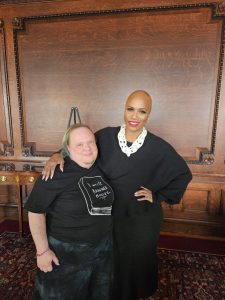 I had the honor of attending a roundtable on book banning convened by Congresswoman Ayanna Pressley in the Library of Congress! She is introducing #BooksSaveLives legislation and we met to talk about current issues in the field, messaging, etc.
I had the honor of attending a roundtable on book banning convened by Congresswoman Ayanna Pressley in the Library of Congress! She is introducing #BooksSaveLives legislation and we met to talk about current issues in the field, messaging, etc.
Of special note, I responded to ye olde “parents can decide what books their kids read” with the point that all young people deserve access to information and stories, including kids that are in homes where it is unsafe for them to be themselves.
The full meeting is here: https://www.youtube.com/watch?v=boGK-p-dKVw&t=1378s Unfortunately, they didn’t get a good mic until after I spoke, but I give my remarks starting at minute 21.
Here are my written notes (I stuck pretty closely to the script):
I’m Alex Gino, author of five middle grade books with LGBTQIA+ characters and themes, particularly transgender and nonbinary kids figuring out who they are and finding community. My debut, MELISSA, released in 2015, won Stonewall and Lambda Literary awards and has been published in 16 languages. It was one of the first traditionally-published books with a trans character for 8-12 year olds, and the first by a trans author. It was also the #5 most banned and challenged book according to the American Library Association in 2016. In 2017 it was #3. And #1 in 2018, 2019, and 2020. It’s not an honor.
The books that are banned and challenged serve as a spotlight on the issues that the larger culture is wrestling with. Books that explore queerness and racism dominate the lists, and children are being used as a proxy in a culture war. And right now, books by Palestinians and Palestinian-Americans are in that hot seat. A couple went to a public library in NYC and took out half a dozen children’s books about Palestine, and has announced they don’t plan to return them. A single patron can wipe an entire culture out of a library’s children’s section. That terrifies me.
Humanity is in narrative. Statistics and data are important, but humans are moved by emotions, and emotions come from stories. Individual people and situations, and seeing the connections between us all. When you take away stories, you dehumanize people. Kids are learning about the world, and they deserve to know who’s here, whether it’s about finding themselves or about growing into a person who sees others for who they are. The alternative is an adult who is not prepared to be part of the beautiful, diverse culture they are part of.
I’m a storyteller, so let me tell you a brief story. Imagine a late night alley. Street lamp flickering in and out. It’s drizzling, for ambiance. And down this alleyway, a guy is walking. Pingponging really, between the buildings, drunk as the proverbial skunk. Relying on a few stereotypes, he’s a bro-dude-type. Cisgender, straight, loves sports. And in the other direction, he sees someone approaching he perceives as a trans woman. May not be a trans woman. May not be the first he’s seen that day. But his drunk brain reads her, and goes, “ohhh, that’s a TRANS woman. Like Melissa. Remember when Ms. Roberts read that book to us? It was so good!” And he goes home. And SHE goes home. Because transness was humanized for him. And if you didn’t fear for that trans woman, that’s a cisgender privilege I can’t imagine. I still fear for her, and I’m the one telling the story.
There’s a reason we say Books Save Lives. Queer lives. Black Lives. Palestinian Lives. People deserve to read books with people like and unlike them. Including young people. Especially young people. And in so doing, we protect our collective humanity.
Leave a Reply